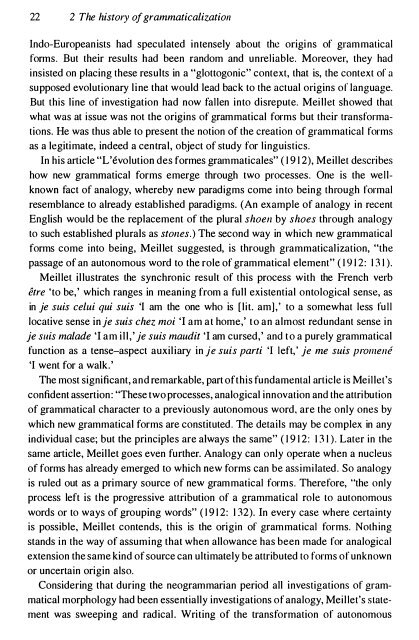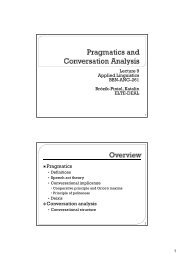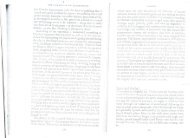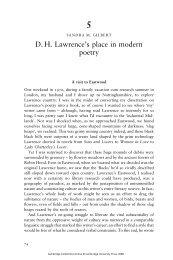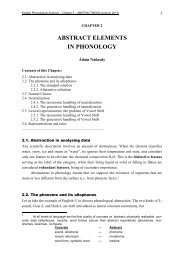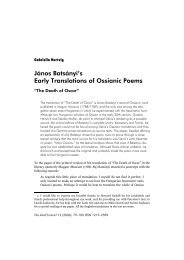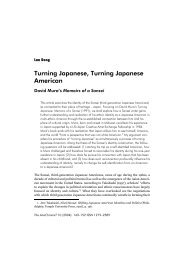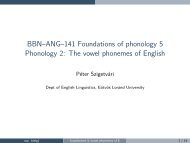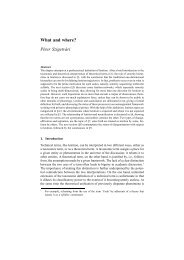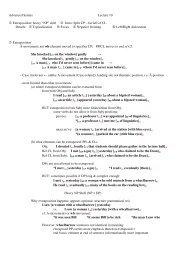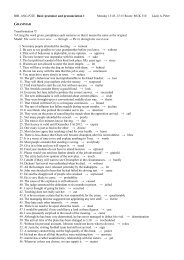Gram - SEAS
Gram - SEAS
Gram - SEAS
You also want an ePaper? Increase the reach of your titles
YUMPU automatically turns print PDFs into web optimized ePapers that Google loves.
22 2 The history of grammaticalizatioll<br />
lndo-Europeanists had speculated intensely about the origins of grammatical<br />
forms. But their results had been random and unreliable. Moreover, they had<br />
insisted on placing these results in a "glottogonic" context, that is, the context of a<br />
supposed evolutionary line that would lead back to the actual origins of language.<br />
But this line of investigation had now fallen into disrepute. Meillet showed that<br />
what was at issue was not the origins of grammatical forms but their transformations.<br />
He was thus able to present the notion of the creation of grammatical forms<br />
as a legitimate, indeed a central, object of study for linguistics.<br />
In his article "L' evolution des formes grammaticales" (1912), Meillet describes<br />
how new grammatical forms emerge through two processes. One is the wellknown<br />
fact of analogy, whereby new paradigms come into being through formal<br />
resemblance to already established paradigms. (An example of analogy in recent<br />
English would be the replacement of the plural shoen by shoes through analogy<br />
to such established plurals as stones.) The second way in which new grammatical<br />
forms come into being, Meillet suggested, is through grammaticalization, "the<br />
passage of an autonomous word to the role of grammatical element" (1912: 131).<br />
Meillet illustrates the synchronic result of this process with the French verb<br />
erre 'to be,' which ranges in meaning from a fu ll existential ontological sense, as<br />
in je suis celui qui suis 'I am the one who is [lit. am],' to a somewhat less fu ll<br />
locative sense inje suis chez moi 'I am at home,' to an almost redundant sense in<br />
je suis malade 'I am ill,' je suis maudit 'I am cursed,' and to a purely grammatical<br />
function as a tense-aspect auxiliary in je suis parti 'I left,' je me suis prol1lelle<br />
'I went for a walk.'<br />
The most significant, and remarkable, part of this fundamental article is Meillel's<br />
confident assertion: "These two processes, analogical innovation and the attribution<br />
of grammatical character to a previously autonomous word. are the only ones by<br />
which new grammatical forms are constituted. The details may be complex in any<br />
individual case; but the principles are always the same" (1912: 131). Later in the<br />
same article, Meillet goes even further. Analogy can only operate when a nucleus<br />
of forms has already emerged to which new forms can be assimilated. So analogy<br />
is ruled out as a primary source of new grammatical forms. Therefore, "the only<br />
process left is the progressive attribution of a grammatical role to autonomous<br />
words or to ways of grouping words" (1912: 132). In every case where certainty<br />
is possible, Meillet contends, this is the origin of grammatical forms. Nothing<br />
stands in the way of assuming that when allowance has been made for analogical<br />
extension the same kind of source can ultimately be attributed to forms of unknown<br />
or uncertain origin also.<br />
Considering that during the neogrammarian period all investigations of grammatical<br />
morphology had been essentially investigations of analogy, Meillet's statement<br />
was sweeping and radical. Writing of the transformation of autonomous


